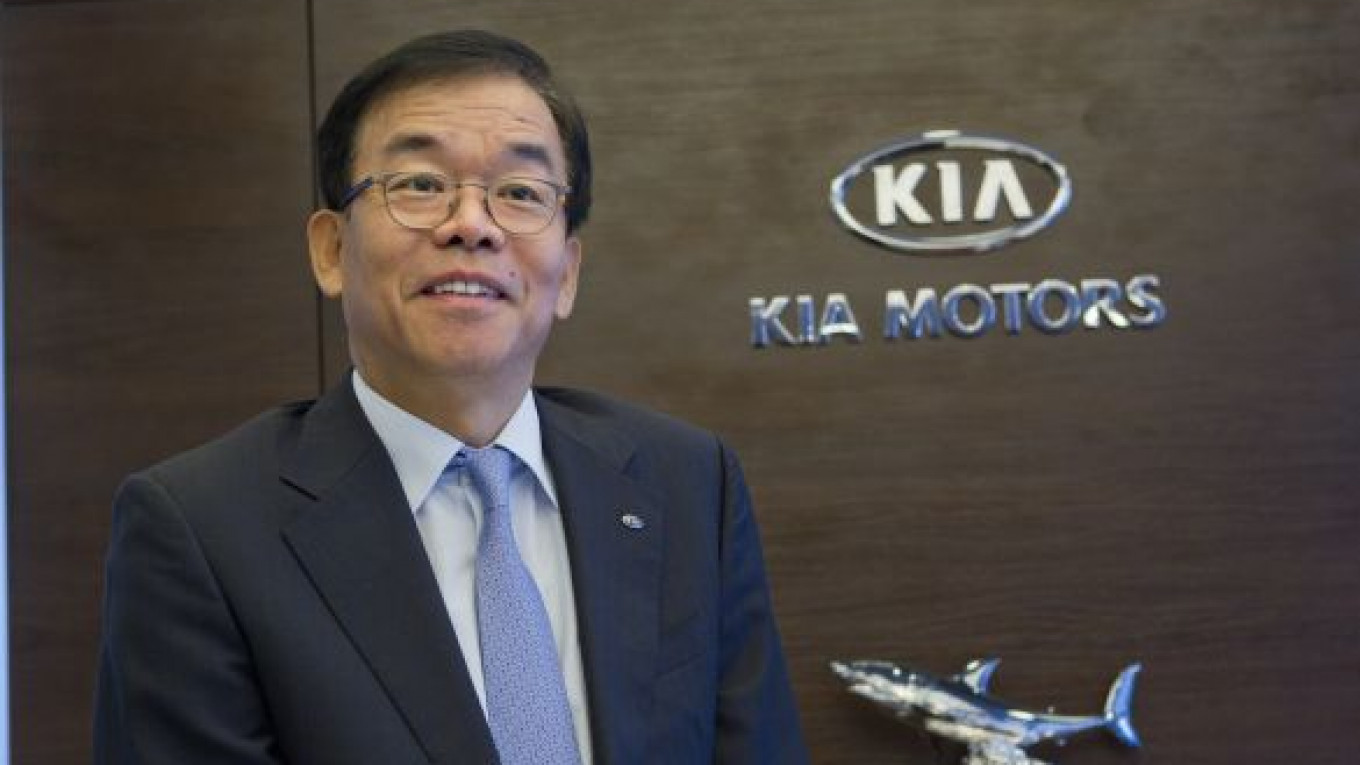Kia Motors could invest in making more cars in Russia, where it is the third best selling brand, if the market rebounds and shoots past the 3-million mark, the South Korean company's local chief said.
If overall sales of new vehicles climb to 3.5 million units, it will be a "good enough" number to consider committing money to a new assembly line, said Kim Seong Hwan, the carmaker's president in Russia.
"All our studies are ready," he said in a rare interview.
Kim did not say when the market might expand that much. Russia is to surpass that level in 2018 at best, according to Oleg Datskiv, chief executive of market research portal Auto-Dealer.ru.
For now, sales are on a slippery slope. Customers are likely to buy 2.8 million new vehicles this year, which would be a 5-percent decline from last year, the Association of European Businesses predicted in June.
Kia cars now roll off assembly lines at two locations in Russia. One is a St. Petersburg plant co-owned with sister company Hyundai Motors, which allotted Kia the capacity to manufacture 100,000 vehicles — now the Rio model, the third bestselling car brand in Russia.
Kia can also order the same amount of cars from a Kaliningrad plant that belongs to Avtotor and now cranks out nine models for the brand.
The Korean car giant aims to sell 200,000 cars locally this year, including imports, meaning it will not utilize its full Russian production capacity.
If Kia's main office decides to add local assembly lines, it may choose places other than St. Petersburg, Kim said.
In a declining market, Kia is one of a few brands that are going against the tide. It sold 4 percent more cars in the first seven months of this year than in the same period last year, according to data by the Association of European Businesses in Russia.
Kim attributed the robust performance to automobile design by Peter Schreyer, a German designer known for his work at Audi, who joined the Korean company in 2006. In addition, Russians appreciate the "young and dynamic" spirit of the brand, Kim said.
With 7 percent market share, Kia trails behind the local auto industry champion AvtoVAZ and France's Renault.
In order to capitalize on Russia's growing appetite for expensive sedans, Kia in March brought its Quoris model to the market — the first time the company introduced a luxury car here, Kim said.
It is also taking proper note of the growing popularity of sport utility vehicles in a country where an increasing number of people can afford them for driving through snow and otherwise rough terrain. Kim estimated that the proportion of SUV sales would bump to 38 percent in about three years from its current 33 percent.
Kim agreed with a commonly held view that Russia could overtake Germany as the largest European market for cars at some point before the end of this decade.Russia's relatively low number of car owners — half of the about 500 vehicles per 1,000 people in Europe — holds promise for growth. Also, more than half of cars in the country are older than 10 years, meaning there is a likelihood that owners will discard them for new ones.
As a larger number of customers is about to start shopping for automobiles, Kia is preparing to counter the renewal of the affordable product lineup by AvtoVAZ and the success of Renault in the low-cost segment with the Logan model, Kim said.
"We are watching them closely," he said. "We have … plans at hand to respond strongly to the offers of our competitors."
Contact the author at medetsky@imedia.ru
A Message from The Moscow Times:
Dear readers,
We are facing unprecedented challenges. Russia's Prosecutor General's Office has designated The Moscow Times as an "undesirable" organization, criminalizing our work and putting our staff at risk of prosecution. This follows our earlier unjust labeling as a "foreign agent."
These actions are direct attempts to silence independent journalism in Russia. The authorities claim our work "discredits the decisions of the Russian leadership." We see things differently: we strive to provide accurate, unbiased reporting on Russia.
We, the journalists of The Moscow Times, refuse to be silenced. But to continue our work, we need your help.
Your support, no matter how small, makes a world of difference. If you can, please support us monthly starting from just $2. It's quick to set up, and every contribution makes a significant impact.
By supporting The Moscow Times, you're defending open, independent journalism in the face of repression. Thank you for standing with us.
Remind me later.






